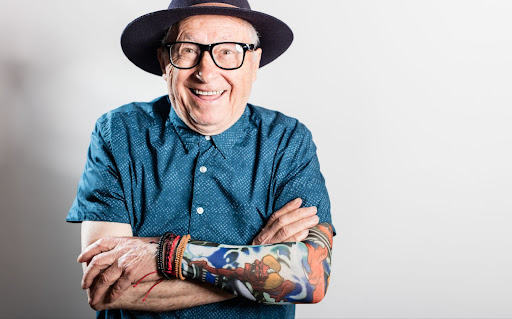A Senior’s Guide to Getting Tattoos at Seventy
Tattoos are an amazing art form of self-expression, with no limit to what you can create – especially with a talented tattoo artist who can bring your vision to life. These days, more and more people, including seniors, are choosing to get ink.
While there are different types of tattoos, most people think of permanent tattoos applied with a needle and ink. It’s becoming increasingly common for people of all ages, including older adults, to embrace tattoos as a form of self-expression.
If you’re interested in body art, our senior’s guide to tattoos will help you understand the basics of getting tattoos as an older adult and prepare for a smooth and enjoyable process.

Aging Skin and Tattoos
When you’re older, getting a tattoo may look a little different than for someone in their late teens or early twenties. Younger people getting a tattoo often have more flexibility in choosing where to place it.
As you age, your skin becomes thinner and less elastic, which can make the healing process take longer. However, tattoos and old age can go hand in hand with the right considerations and planning.
You can certainly still get a tattoo, but you’ll need to think about the best spot for it. Typically, bony areas of the body with little fat are the most painful places to get a tattoo. Choosing an area with more fatty tissue can provide cushioning, making the experience less painful.
For older adults, selecting a location where the skin is less prone to sagging or significant changes over time can help the tattoo maintain its appearance.
These areas include:
- Forearm
- Outer arm
- Outer thigh
- Shoulder
- Parts on the back away from your spine
When you have an idea of where you’d like your tattoo, you can start thinking about what kind of tattoo you want.
How To Choose the Right Tattoo for Older Skin
When you’re getting a tattoo, you’ll likely want it to have the following characteristics:
- Thick lines
- Minimal detail
- A more simple tattoo design that can be done in one session
Having bolder lines and less detail will give your skin a better chance to heal. Intricate, fine-line designs can be more difficult for older adults because of thinning skin. Of course, if you’re interested in a more complex design, you just need to be prepared for multiple sessions.
While you’re finding the right tattoo for you, it’s just as important to find the right tattoo artist. You want a reputable tattoo shop and artist, preferably one who has tattooed older adults. They’ll know how to tattoo thinning skin and can make informed recommendations for you regarding aftercare. An online search can help you find the perfect tattoo artist in your area.
At Freedom Village, we understand the importance of embracing personal expression, whether through body art or other forms of creativity. Our vibrant community supports seniors in exploring new interests and living their best lives.

Popular Tattoo Designs for Seniors
Tattoos can be deeply personal and meaningful, reflecting life experiences, memories or passions. For seniors, popular designs often include:
- Floral Designs – Flowers like roses or sunflowers represent growth and milestones. Choose a simple or intricate design based on your preference.
- Family-Inspired Tattoos – Honor loved ones with names, birth dates or symbols like hearts or trees.
- Meaningful Words or Quotes – Use inspirational quotes or mottos that reflect personal values and motivations.
- Animal and Pet Tattoos – Represent beloved pets with designs ranging from paw prints to detailed portraits.
- Symbolic Designs – Symbols like hearts, stars or infinity signs convey love and connection, and are customizable to your personal style.
Medication and Tattooing
If you take any medication, it’s important to speak with your doctor before you decide to get a tattoo. The medications you take could have an effect on your tattoo process.
For example, it’s common for older adults to take blood thinners to avoid issues with clotting. Common blood thinning medications include:
- Aspirin
- ELIQUIS
- BRILINTA
- Pradaxa
- XARELTO
However, when you get your tattoo, you may experience some bleeding and bruising around the area. Taking medications like the ones above can exacerbate those symptoms.
You may also want to avoid substances that can cause blood thinning, like caffeine and alcohol, for two days before your scheduled tattoo appointment.
Tattoo Care for Aging Skin
Proper tattoo care is essential for everyone, but it’s especially crucial for elderly people, as aging skin tends to be thinner and more delicate.
For elderly people, tattoos can be a meaningful way to express themselves, celebrate life experiences or honor personal milestones, making proper care even more important to preserve the design and promote healthy healing.
By taking the time to care for your skin, you ensure that your new tattoo will heal beautifully and remain vibrant over time.
Follow these aftercare tips to help your tattoo heal properly:
- Clean the skin gently with plain soap and water.
- Avoid direct water pressure on the tattoo, especially in the shower.
- Pat the area dry, avoiding any vigorous rubbing.
- Moisturize regularly with a tattoo-safe lotion to keep the skin hydrated.
- Protect the tattoo from direct sunlight by keeping it covered or using sunscreen once healed.
- Refrain from swimming or submerging the tattoo in water until it’s fully healed.
- Avoid picking at the tattoo to prevent scarring or infection.
For elderly people, tattoos may take slightly longer to heal due to the natural aging process, so patience and diligent care are key. With proper aftercare, you can enjoy your tattoo as a lasting form of self-expression while keeping your skin healthy and protected.
Why Should You Get a Tattoo?
People get tattoos for a variety of personal reasons. Maybe to commemorate an important person or event, to highlight a personality trait or document a memory, or perhaps just because it’s something fun and exciting to try. No matter the why, tattoos have become increasingly popular, with more than 30% of the US population having at least one tattoo.
Today’s seniors are living their best lives and trying all sorts of new things. If you think a tattoo is your next adventure, we hope our guide has helped provide some good advice. And let’s face it – there’s probably no better way to convince your teenage grandkids of how cool you are!
Live Your Best Life at Freedom Village
At Freedom Village, we believe retirement is a time to embrace new opportunities. Our Life Plan Community offers a vibrant lifestyle where seniors can explore new interests, engage in creative activities, and connect with others – all while enjoying peace of mind knowing that a full continuum of care is available if needed.
Senior living opens doors to a fulfilling and active life, giving you the freedom to grow, express yourself, and live each day to the fullest. Reach out today at (949) 423-6653 to learn how we support seniors in living their best lives at Freedom Village.




